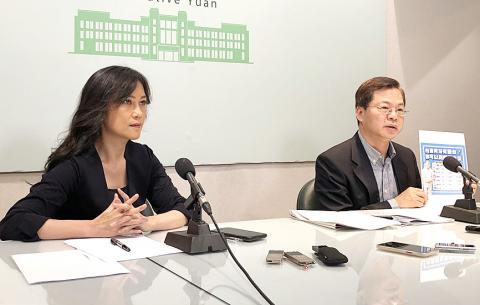Minister Without Portfolio Kung Ming-hsin (龔明鑫) yesterday unveiled a plan to turn Taiwan into Asia’s research, development and manufacturing hub for high-end products on the back of a successful program to boost investment amid the US-China trade dispute.
Since January, when the government unveiled the first program to encourage Taiwanese companies operating in China to invest back home, local firms have pledged NT$700 billion (US$22.94 billion), with NT$225.5 billion expected to be realized this year, Kung told a news conference at the Executive Yuan.
Thanks to this newfound investment momentum and local firms bringing back production of higher-end products — including servers, laptops and bicycles — President Tsai Ing-wen (蔡英文) has put forward a plan to make the nation a high-end research, development and manufacturing hub, he said.

Photo: CNA
To realize the plan, the government is identifying underused or unused land in industrial zones, particularly those in central and southern Taiwan, where returning companies could operate, he added.
The government expects to free up at least 600 hectares of land in industrial zones nationwide for use by returning firms, he said, adding that part of the space would come from the planned Ciaotou Science Park (橋頭科學園區) in Kaohsiung and the third-phase expansion of Tainan’s Southern Taiwan Science Park (南部科學工業園區).
As manufacturing practices used by Taiwanese companies in China are unlikely to apply to Taiwan, the government expects to use artificial intelligence and smart machinery from its “five plus two” innovative industries plan on new production lines, he said, adding that this would facilitate a total solution, rather than the nation just being a manufacturing hub of components.
The government has drafted a “corporate innovation refinement program” and aims to engage in forward-looking collaborations with local and foreign companies ready to make a sizeable investment or create a substantial number of job opportunities in Taiwan, Kung said.
The government is willing to subsidize these collaborations, he added.
The international trend is toward sustainability, so nations that do not power their production lines with renewable energy might see their goods boycotted by nations that have provisions on dealing only with environmentally friendly businesses, which would negatively affect exports and competitiveness, he said.
Taiwan needs to establish green supply chains and realize its goal of making renewables 20 percent of its energy mix by 2025, he said.
As of Thursday, investments by small and medium-sized enterprises (SME) had reached NT$32.9 billion, far exceeding the government’s estimate of NT$20 billion, so the Cabinet plans to increase subsidies to SMEs by more than doubling the government’s SME development fund, which is currently NT$20 billion, Kung said.
From 2000 to 2008, when Chen Shui-bian (陳水扁) was the president, foreign investment averaged US$7 billion annually, before slumping to US$5.3 billion during Ma Ying-jeou’s (馬英九) presidency and then rebounding to US$10 billion in 2016, and remaining at about that level since then, Kung said.
By contrast, investment in China by Taiwanese companies has fallen from an annual average of at least US$10 billion to about US$3 billion so far this year, a difference of more than US$7 billion, he added.
The trend of local companies redirecting investments from China to Taiwan matches the expected NT$255.2 billion to be repatriated by firms this year, Kung added.

Taipei has once again made it to the top 100 in Oxford Economics’ Global Cities Index 2025 report, moving up five places from last year to 60. The annual index, which was published last month, evaluated 1,000 of the most populated metropolises based on five indices — economics, human capital, quality of life, environment and governance. New York maintained its top spot this year, placing first in the economics index thanks to the strength of its vibrant financial industry and economic stability. Taipei ranked 263rd in economics, 44th in human capital, 15th in quality of life, 284th for environment and 75th in governance,

The Sports Administration yesterday demanded an apology from the national table tennis association for barring 17-year-old Yeh Yi-tian (葉伊恬) from competing in the upcoming World Table Tennis (WTT) United States Smash tournament in Las Vegas this July. The sports agency said in a statement that the Chinese Taipei Table Tennis Association (CTTTA) must explain to the public why it withdrew Yeh from the WTT tournament in Las Vegas. The sports agency said it contacted the association to express its disapproval of the decision-making process after receiving a complaint from Yeh’s coach, Chuang

Control Yuan Secretary-General Lee Chun-yi (李俊俋) tendered his resignation last night, admitting that he had misused a government vehicle, as reported by media. His resignation was immediately accepted by the Control Yuan. In a statement explaining why he had resigned, Lee apologized for using a Control Yuan vehicle to transport his dog to a pet grooming salon on May 20. The issue first came to light late last month, when TVBS News reported that Lee had instructed his driver to take the dog to the salon. The news channel broadcast photos that it said were taken by an unnamed whistle-blower, which purportedly showed the

A former officer in China’s People’s Liberation Army (PLA) who witnessed the aftermath of the 1989 Tiananmen Square massacre has warned that Taiwan could face a similar fate if China attempts to unify the country by force. Li Xiaoming (李曉明), who was deployed to Beijing as a junior officer during the crackdown, said Taiwanese people should study the massacre carefully, because it offers a glimpse of what Beijing is willing to do to suppress dissent. “What happened in Tiananmen Square could happen in Taiwan too,” Li told CNA in a May 22 interview, ahead of the massacre’s 36th anniversary. “If Taiwanese students or